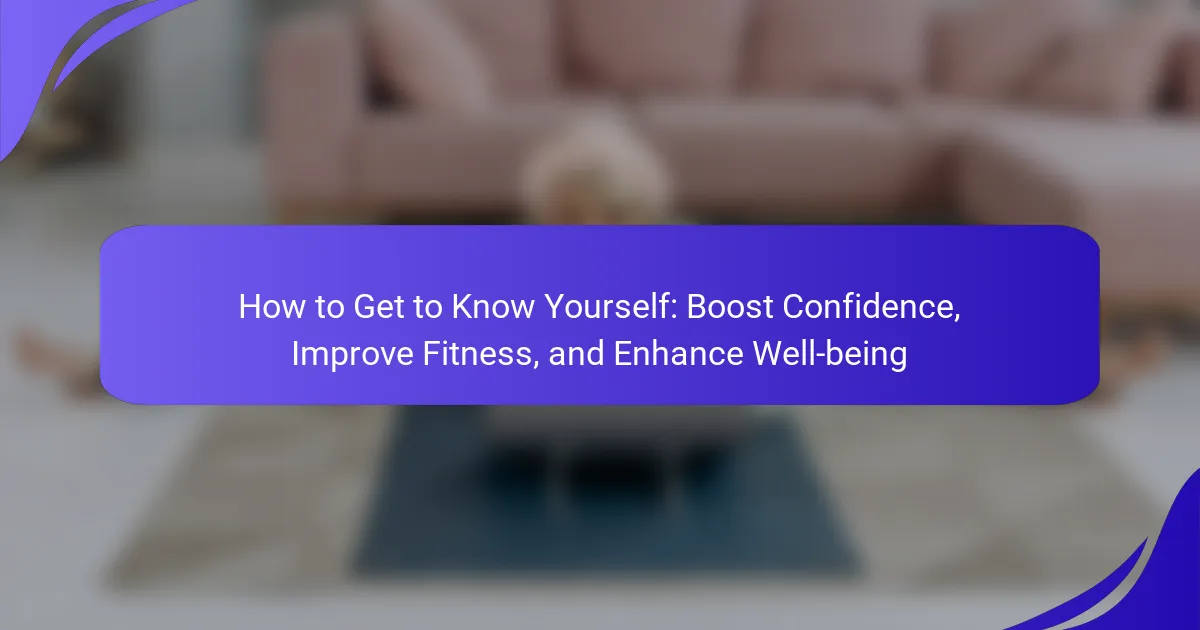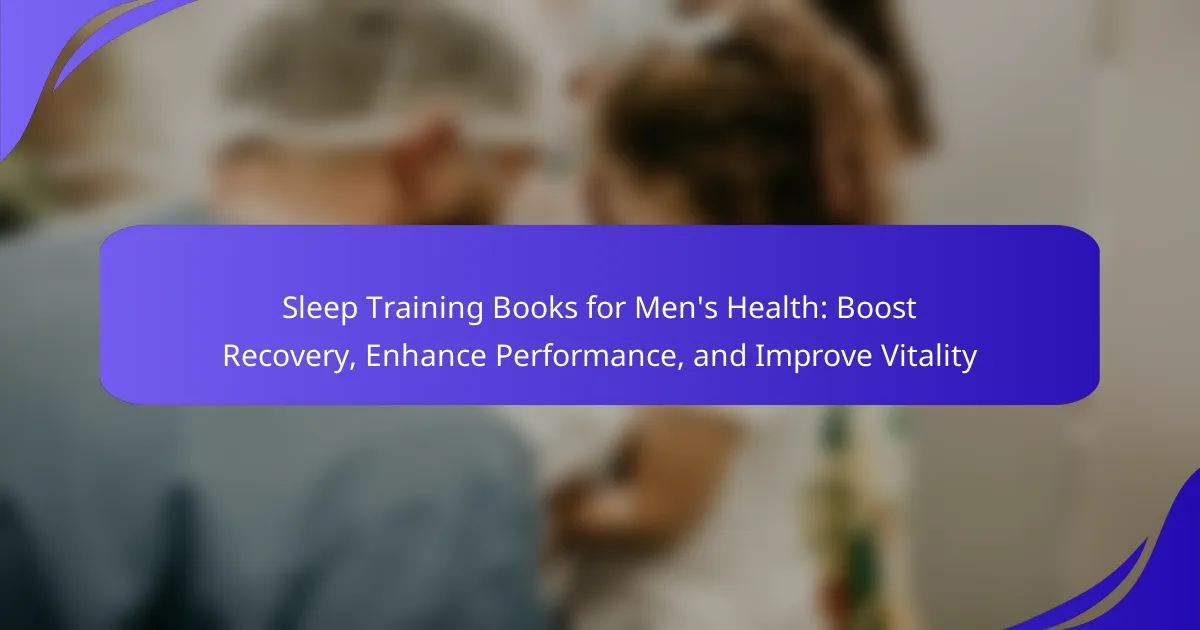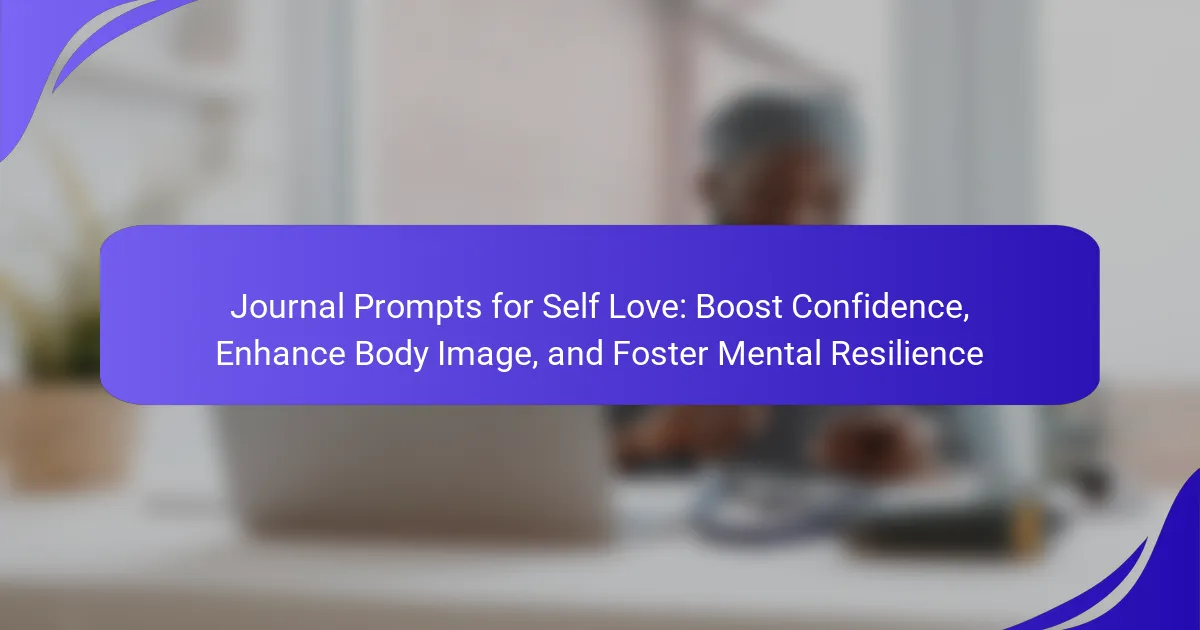Understanding yourself is essential for boosting confidence, improving fitness, and enhancing overall well-being. This article explores self-awareness techniques, the benefits of regular exercise, unique self-discovery practices, and practical steps for improving mental and physical health. By engaging in these strategies, individuals can foster a positive self-image and achieve a higher quality of life.

How can self-awareness boost confidence?
Self-awareness significantly boosts confidence by fostering a deeper understanding of personal strengths and weaknesses. This clarity allows individuals to set realistic goals and embrace challenges. As a result, self-awareness enhances decision-making and reduces anxiety, contributing to a more positive self-image. Engaging in reflective practices, such as journaling or meditation, can further strengthen this connection, promoting emotional resilience and self-acceptance.
What are the key components of self-awareness?
Self-awareness involves understanding your thoughts, emotions, and behaviours. Key components include emotional awareness, self-reflection, and understanding personal values. Emotional awareness helps identify feelings and their impact. Self-reflection encourages evaluating experiences and learning from them. Understanding personal values guides decision-making and enhances authenticity. These components collectively boost confidence and improve well-being.
How does self-awareness impact physical fitness?
Self-awareness significantly enhances physical fitness by fostering a deeper understanding of personal strengths and weaknesses. This insight allows individuals to set realistic fitness goals, monitor progress effectively, and adjust their routines based on their unique attributes. For example, self-aware individuals are more likely to recognise when they need rest or when to push harder, leading to improved performance and reduced risk of injury. As a result, self-awareness not only boosts confidence but also contributes to overall well-being by encouraging healthier lifestyle choices.
What exercises promote self-reflection?
Self-reflection exercises include journaling, meditation, and guided self-assessment. Journaling encourages expression of thoughts and feelings, enhancing self-awareness. Meditation promotes mindfulness, allowing individuals to observe their thoughts without judgement. Guided self-assessment tools provide structured reflection, helping to identify personal strengths and areas for growth. These practices collectively boost confidence, improve fitness, and enhance overall well-being.
How can journaling enhance self-knowledge?
Journaling enhances self-knowledge by promoting reflection and clarity. It allows individuals to explore thoughts and feelings, leading to increased awareness of personal values and beliefs. Regular journaling can reveal patterns in behaviour and emotional responses, fostering deeper understanding. As a result, this practice boosts confidence and supports personal growth.

What are the universal benefits of improved fitness?
Improved fitness offers universal benefits that enhance overall well-being. Key advantages include increased energy levels, improved mental health, better physical health, and enhanced self-esteem. Regular exercise can reduce the risk of chronic diseases, boost mood through endorphin release, and foster a sense of accomplishment. As a result, individuals experience a holistic improvement in their quality of life.
How does physical fitness influence mental health?
Physical fitness significantly enhances mental health by reducing anxiety, depression, and stress. Regular exercise promotes the release of endorphins, which boost mood and improve overall emotional well-being. Studies indicate that engaging in physical activity can lead to increased self-esteem and cognitive function. Furthermore, consistent fitness routines foster resilience, helping individuals cope with life’s challenges more effectively.
What role does nutrition play in fitness and well-being?
Nutrition is crucial for fitness and well-being as it fuels the body, supports recovery, and enhances overall health. A balanced diet rich in nutrients boosts energy levels, aids muscle repair, and improves mental clarity. For example, consuming adequate protein can enhance muscle growth, while healthy fats support brain function. Moreover, hydration is essential for optimal performance and recovery. By prioritising nutrition, individuals can significantly improve their fitness outcomes and overall well-being.
What are the best foods for energy and recovery?
The best foods for energy and recovery include complex carbohydrates, lean proteins, and healthy fats. Foods like quinoa, chicken, and avocados provide essential nutrients. Complex carbs offer sustained energy, while proteins aid muscle repair. Incorporating fruits like bananas and berries enhances recovery due to their vitamins and antioxidants. Hydration with water or electrolyte-rich drinks is crucial.
How can setting fitness goals enhance self-esteem?
Setting fitness goals can significantly enhance self-esteem by providing clear targets and a sense of accomplishment. Achieving these goals reinforces self-worth and promotes a positive self-image. Regularly meeting fitness objectives can lead to improved physical health, which further boosts confidence. As a result, individuals often experience greater motivation and resilience in other areas of life.

What unique strategies can men use to enhance self-confidence?
Men can enhance self-confidence through unique strategies like self-reflection, setting achievable goals, and engaging in physical fitness. Self-reflection helps identify strengths and areas for improvement, fostering a deeper understanding of oneself. Setting achievable goals provides a sense of accomplishment, boosting confidence with each success. Engaging in physical fitness not only improves health but also releases endorphins, enhancing mood and self-esteem. These strategies collectively create a strong foundation for lasting self-confidence.
How do social connections influence confidence levels?
Social connections significantly enhance confidence levels. Positive relationships provide emotional support, fostering a sense of belonging and self-worth. Engaging with others can lead to improved self-image and reduced anxiety, which are crucial for building confidence. Studies show that individuals with strong social ties tend to exhibit higher self-esteem and resilience. As a result, nurturing these connections can lead to a more confident and fulfilling life.

What rare practices can lead to deeper self-discovery?
Engaging in rare practices can significantly enhance self-discovery. Techniques like sensory deprivation, nature immersion, and deep meditation promote introspection and self-awareness. Sensory deprivation allows individuals to confront their thoughts without external distractions. Nature immersion fosters a connection with the environment, leading to clarity and insight. Deep meditation encourages exploration of one’s inner landscape, revealing hidden emotions and beliefs. Each of these practices uniquely contributes to understanding oneself on a deeper level.
How can meditation specifically benefit men’s health?
Meditation can significantly enhance men’s health by reducing stress, improving mental clarity, and boosting emotional resilience. Regular practice leads to lower blood pressure, better sleep, and increased self-awareness. Studies show that men who meditate experience reduced anxiety levels and improved overall well-being. This unique attribute of meditation helps men cultivate a deeper connection with themselves, fostering confidence and promoting healthier lifestyle choices.
What uncommon fitness activities boost self-awareness?
Uncommon fitness activities that boost self-awareness include activities like rock climbing, tai chi, aerial yoga, and martial arts. These practices encourage mindfulness and introspection, enhancing personal understanding. Rock climbing fosters problem-solving skills and resilience, while tai chi promotes relaxation and mental clarity. Aerial yoga combines strength with focus, and martial arts develop discipline and self-reflection. Engaging in these activities can significantly improve confidence and overall well-being.

What practical steps can men take to improve their well-being today?
To improve well-being today, men can take practical steps that boost confidence, fitness, and overall health. Start by setting achievable fitness goals, such as daily exercise routines or healthy eating habits. Engage in mindfulness practices, like meditation or journaling, to enhance self-awareness. Building social connections through activities or support groups can also improve mental health. Prioritise sleep and hydration to support physical and mental well-being. Lastly, consider seeking professional guidance for personalised strategies.
What common mistakes should be avoided in fitness journeys?
To avoid common mistakes in fitness journeys, focus on consistency, setting realistic goals, and listening to your body. Many individuals overtrain or skip rest days, leading to burnout or injury. Tracking progress is essential; without it, motivation may wane. Additionally, neglecting nutrition can hinder results, as diet plays a critical role in fitness. Lastly, seeking support from a community or fitness professional can enhance accountability and provide valuable guidance.
How can men create a personalized fitness plan?
To create a personalized fitness plan, men should assess their goals, current fitness level, and preferences. Start by defining specific objectives, such as weight loss or muscle gain. Next, evaluate your fitness level through assessments like endurance tests or strength measurements. Incorporate activities you enjoy to enhance adherence. Schedule workouts consistently, ensuring a balance of strength training, cardio, and flexibility exercises. Finally, monitor progress regularly and adjust the plan as needed to stay aligned with evolving goals.
What elements should be included in a fitness plan?
A fitness plan should include goal setting, a balanced workout routine, nutrition guidelines, and progress tracking. Establish clear, achievable goals to enhance motivation. Incorporate strength training, cardiovascular activities, and flexibility exercises to promote overall fitness. Nutrition is vital; focus on whole foods, hydration, and portion control. Regularly track progress to adjust the plan and maintain accountability.
How can progress be effectively tracked?
To effectively track progress, establish clear, measurable goals and regularly assess your achievements. Utilize journals or apps to document milestones and reflect on your journey. Regular feedback helps maintain motivation and adjust strategies.
What expert insights can help men stay motivated?
To stay motivated, men can focus on setting clear goals, tracking progress, and celebrating small achievements. Emphasising self-awareness enhances confidence and well-being. Engaging in regular physical activity boosts motivation through improved fitness. Building a supportive network fosters accountability and encouragement.



